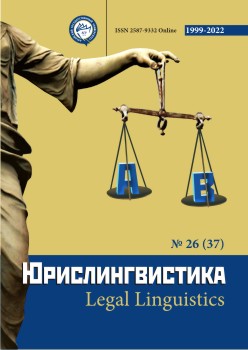Conflictogenic Potential of the Dominance Phenomenon in the Jurislinguistic Aspect
УДК 811 ББК 81.1
Abstract
The aim of this study is an expert verification of the conflict potential perception of the Russian parliamentarians’ asocial communicative dominance, expressed by an invective communicative strategy in direct and indirect forms. The relevance of the study is determined by the interest of modern scientists for the problems of political discourse; the issues of conflict and conflictogen from the standpoint of Legal Linguistics, Pragmalinguistics and Sociolinguistics; the study of the actualization of psychological personality traits in the speech behavior of the individual. The material of the study is the parliamentarians’ reporting speeches in a form of a monologue from the transcript of the final session of the State Duma in 2021. These politicians are the leaders and representatives of the Russian political parties: Yedinaya Rossiya, KPRF, LDPR. As a result of the linguistic analysis, the use of an invective strategy by the parliamentarians was revealed, which is implemented through the corresponding tactics: emphasizing one’s own merits, opposing others, imposing one’s own point of view, irony. These tactics are implemented in an indirect form. A focussed experiment with the participation of the younger generation representatives showed that 80 % of the students and 75 % of the young people without higher education responded to the incentives provided by a potential conflict generator by entering into a conflict, and only 20 % of the young people with higher education and 25 % of the respondents without higher education leveled the conflict , which reveals the conflictogenic potential of the invective communicative strategy tactics, expressed in an indirect form. In addition, there is a tendency for a stronger reaction to conflict potential among the representatives of the younger generation who have higher or incomplete higher philological education than among respondents without higher education.
Downloads
Metrics
References
Балясникова О.В. Опыт психолингвистического исследования значения одного из ключевых слов конфликтогенного текста / Вестник Новосибирского гос. ун-та. Серия: Лингвистика и межкультурная коммуникация. - 2015. № 13(4). - С. 22-27.
Голев Н.Д. Правовое регулирование речевых конфликтов и юрислингвистическая экспертиза конфликтогенных текстов / Правовая реформа в Российской Федерации: общетеоретические и исторические аспекты. Барнаул, 2002. - С. 125-134.
Голев Н.Д. Юрислингвистика и лингвоконфликтология (к типологии языковых конфликтов). Современная филология: актуальные проблемы, теория и практика. Красноярск, 2007. - С. 20-30.
Дементьев В.В. Непрямая коммуникация. М., 2006.
Ким Г.В. Признаки отдельных видов конфликтогенного текста (на примере материалов региональной судебной практики) / Современные проблемы лингвистики и методики преподавания русского языка в вузе и школе. - 2017. № 27. - С. 100-103.
Макаренко Г.С. Эксплицитные и имплицитные маркеры конфликтогенности публицистического текста / Вестник Башкирского университета. - 2016. № 1(21). - С. 192-195.
Матвеева Г.Г., Зюбина И.А. Скрытое значение, скрытый смысл и нюансы смысла в коммуникации / Известия Волгоградского государственного педагогического университета. - 2019. - № 2(135). - С. 85-92.
Махина Л.А. Высказывания с негативной оценочностью как элементы структуры и смысла конфликтогенных текстов / Litera. - 2016. - № 4. - С. 1-10.
Меликян В.Ю. Методология и практика юридизации инвективной лексики / Язык и право: актуальные проблемы взаимодействия. - 2019. - № 9. - С. 5-26.
Муртазина Е.П. Взаимосвязи характеристик системы поведенческого доминирования и психопатологических состояний человека / Современные проблемы науки и образования. - 2018. - № 6. URL: https://science-education.ru/ru/article/view?id=28328
Стенограмма заседаний 22 декабря 2021 г. URL: http://transcript.duma.gov.ru/node/5765/
Burton J.W. Conflict: Resolution and Prevention. New York, 1990.
Hodges-Simeon C.R., Gaulin S.J.C., Puts D.A. Different vocal parameters predict perceptions of dominance and attractiveness / Human Nature. - 2010. - № 21(4). - Pp. 406-427.
Kuwabara K., Yu S., Lee A.J., Galinsky A.D. Status decreases dominance in the west but increases dominance in the east / Psychological Science. - 2015. № 27. - Pp. 127-137.
Li X., Ye Q., Yang G. The lack of dominance and choice deferral: Choosing to defer to cope with the feeling of being out of control / The Journal of Social Psychology. - 2017. - № 6(157). - С. 754-765.
Copyright (c) 2022 Ирина Зюбина

This work is licensed under a Creative Commons Attribution 4.0 International License.
The authors, which are published in this journal, agree to the following conditions:
1. Authors retain the copyright to the work and transfer to the journal the right of the first publication along with the work, at the same time licensing it under the terms of the Creative Commons Attribution License, which allows others to distribute this work with the obligatory indication of the authorship of this work and a link to the original publication in this journal .
2. The authors retain the right to enter into separate, additional contractual agreements for the non-exclusive distribution of the version of the work published by this journal (for example, to place it in the university depository or to publish it in a book), with reference to the original publication in this journal.
3. Authors are allowed to post their work on the Internet (for example, in a university repository or on their personal website) before and during the review process of this journal, as this may lead to a productive discussion, as well as more links to this published work (See The Effect of Open Access).











